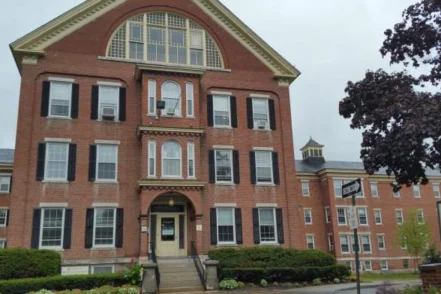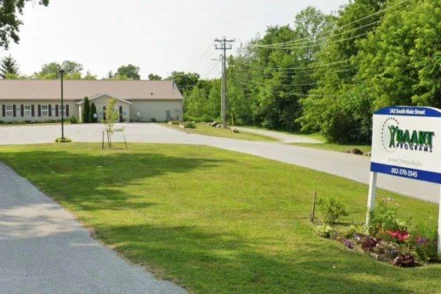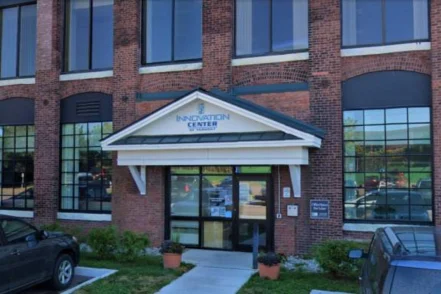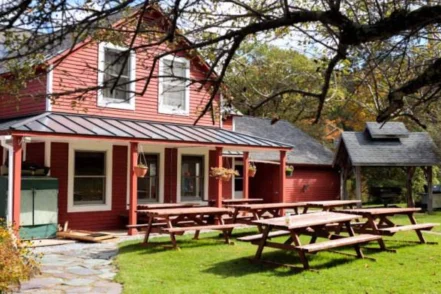About Brattleboro Retreat
Brattleboro Retreat is a comprehensive treatment center that offers a variety of services to help people struggling with addiction. They offer inpatient and outpatient programs as well as detox and aftercare support. Their programs are designed to meet the unique needs of each individual, and they offer a variety of therapies, including cognitive behavioral therapy, dialectical behavior therapy, family therapy, group therapy, and individual therapy. They also have a special program for LGBTQ individuals and a military program.
Addiction Treatment Programs
Alcohol Rehab
Alcohol rehab in Vermont helps clients find the motivation to make a change and gives them the tools to achieve long-term sobriety. Alcohol rehab may include detox, inpatient treatment, and/or outpatient care. You’ll learn the roots of addiction and learn how to build a substance-free life.
Dual Diagnosis
People with a dual diagnosis may be using substances to self-medicate. A high-quality rehab in Vermont can address both issues and help you reach recovery. A dual diagnosis program uses evidence-based approaches to help you overcome both your mental health concerns and substance use. This may include mental health medication, counseling, and more.
Adult Program
Adult programs in Vermont address a wide range of substance use issues while also helping clients with concerns such as raising children or building a career. An adult program gives you the skills you need to overcome addiction and address the unique challenges of managing your work, relating to your family, raising children, and balancing a variety of other responsibilities
LGBTQ Friendly Rehab
For those who identify as LGBTQ+, an LGBTQ+ friendly rehab in Vermont can give you the understanding and safety you need to break free from addiction. Along with traditional evidence-based treatment, clients may receive trauma-focused care, peer support, and classes in overcoming specific challenges.
Military Rehab
Finding a military rehab in Vermont can make all the difference in helping you overcome substance use if you’re a veteran or service member. The staff understands that military members experience things civilians couldn’t imagine, and these programs offer personalized treatment that incorporates your physical, mental, and emotional needs.
Men's Rehab
A men’s rehab in Vermont addresses the unique needs men have and allows them to build relationships in a gender-specific environment. A men’s program gives you the skills you need to overcome addiction and address challenges such as family relationships, fatherhood, emotional management, and more.
Women's Rehab
Those who join a women’s rehab program in Vermont are given training in key life skills to help them address their unique challenges. A women’s program gives you the skills you need to overcome addiction and address your unique challenges, such as motherhood, building a career, having healthy relationships, and more.
Young Adult Rehab
When people join a young adult rehab in Vermont, they learn key life skills while receiving treatment. A young adult program gives you the skills you need to overcome addiction and address the unique challenges of transitioning from the teen years to adulthood.
Insurance Coverage
Medicaid
If you qualify for Medicaid in Vermont, using the coverage to pay for rehab can allow you to get the care you need. Medicaid often covers the full cost of rehab if you choose a center that accepts it. You can look for multiple types of care, including detox, inpatient, and outpatient.
Private insurance
If you have private insurance in Vermont, you can use your coverage to help pay for rehab treatment. Contact your insurer to find out coverage details and to learn what out-of-pocket costs to expect, such as deductibles and copays.
Self-pay options
In Vermont, one way to pay for rehab is to use self-pay, also known as private pay. You can use a medical loan, write a check, or electronically send money to the center you prefer. Payment arrangements may vary depending on the type of treatment.
Financial aid
For those who qualify, using financial aid programs to pay for treatment in Vermont can make rehab more accessible. Financial aid directly from the treatment center is one option, or you might be able to find grants or scholarships from community groups or local non-profits.
Medicare
One option for paying for rehab in Vermont is using Medicare. Plans vary, so be sure to get all the details before you start treatment. You may have out-of-pocket costs such as deductibles and copays.
Military insurance
When looking for ways to pay for rehab in Vermont, consider military insurance if you’re a service member or veteran. You’ll want to contact your insurer to find out what treatment centers are in-network with your plan and get the details on what out-of-pocket costs you might have, such as deductibles and copays.
Financing available
One option for paying for rehab in Vermont is using financing options if they are available. Treatment centers may have financing options such as payment plans, grants, or scholarships. You may also decide to get a medical loan to pay for treatment.
Levels of Care
- 1
Detox Treatment
Alcohol and drug rehab in Vermont generally starts with detox, which lets you start fresh on building a new life. Detox is often medically supervised, helping it be safe and as comfortable as possible. Medical supervision may include FDA-approved medication and other treatments.
- 2
Inpatient Rehab
Inpatient treatment in Vermont is led by professionals who help you build new habits and skills to live a substance-free life. Some of the elements of inpatient treatment include individual and group counseling, skill-building, relapse prevention, and help with essentials like employment and housing.
- 3
Outpatient Rehab
If you’ve recently finished a residential treatment program, participating in outpatient treatment in Vermont can help you reinforce and practice your new habits. Outpatient treatment sessions generally last 60 to 90 minutes and may include discussing a specific issue, sharing wins and challenges, education about specific topics, or developing life skills.
- 4
Aftercare Support
In Vermont, aftercare allows you to access additional resources and support to help you avoid relapse after treatment. Aftercare may include connections to 12-step and other support groups, housing and employment resources, community recovery centers, and more.
Therapies
Cognitive Behavior Therapy
Cognitive behavioral therapy in Vermont involves being aware of how your thoughts are connected to your feelings and behavior. During treatment, you’ll examine common thought disortions, identify learned negative behaviors, and learn the skills necessary to consciously choose a different reaction to each situation.
Dialectical Behavior Therapy
Dialectical behavioral therapy in Vermont involves embracing your strengths and building confidence in your ability to make positive changes. During treatment, you’ll unlearn unwanted thoughts and behaviors, practice and reinforce positive coping strategies, and empower yourself to create the life you want.
Family Therapy
Many people have challenging family backgrounds, and addiction can create unhealthy dynamics as well. Family therapy in Vermont allows you to address these concerns. Family therapy is only one element of rehab treatment, along with activities, peer support, individual and group counseling, relapse prevention, and more. Together, all these methods support you in establishing long-term recovery.
Group Therapy
It’s easy to feel isolated when you battle addiction, but group therapy in Vermont can show you you’re not alone. Group therapy sessions generally last 60 to 90 minutes and may include discussing a specific issue, sharing wins and challenges, education about specific topics, or developing life skills.
Individual Therapy
Individual therapy in Vermont can provide professional support and accountability as you work through substance use treatment. Individual therapy is a normal part of evidence-based treatment programs and may be a part of inpatient treatment, outpatient care, or both. Topics include processing past events that may have contributed to substance use, learning new life skills, and relapse prevention strategies.
Trauma Therapy
Trauma is an emotional response to a terrible event, and some people use substances to numb those emotions. Trauma-informed therapy in Vermont can help you address what happened and consciously create a healthier response. Trauma-informed therapy may be part of both inpatient and outpatient substance use treatment, and may include peer support, mental health medications, mindfulness, and developing new coping strategies.
Location
Contact Brattleboro Retreat
Top Drug Rehab Centers in Vermont
-
 Vermont
VermontBrattleboro Retreat
22 Anna Marsh Ln Brattleboro, VT 05301
-
 Vermont
VermontBAART Programs St Albans
242 S. Main Street Saint Albans, Vermont 05478
-
 Vermont
VermontValley Vista Vergennes
1 Alden Place Vergennes, Vermont 05491
-
 Vermont
VermontClara Martin Center North Main Street
11 North Main Street Randolph, Vermont 05060
-
 Vermont
VermontBrattleboro Comprehensive Treatment Center
16 Town Crier Drive Brattleboro, Vermont 05301
-
 Vermont
VermontCentral Vermont Substance Abuse Services
100 Hospitality Drive Barre, Vermont 05641
-
 Vermont
VermontCenterpoint Adolescent Treatment
1025 Airport Drive South Burlington, Vermont 05403
-
 Vermont
VermontWhite River Junction VA Medical Center Burlington Lakeside CBOC
128 Lakeside Avenue, Suite 260 Burlington, Vermont 05401
-
 Vermont
VermontSpring Lake Ranch
1169 Spring Lake Road Cuttingsville, Vermont 05738
-
 Vermont
VermontBAART Programs Berlin
617 Comstock Road, Suite 5 Barre, Vermont 05602